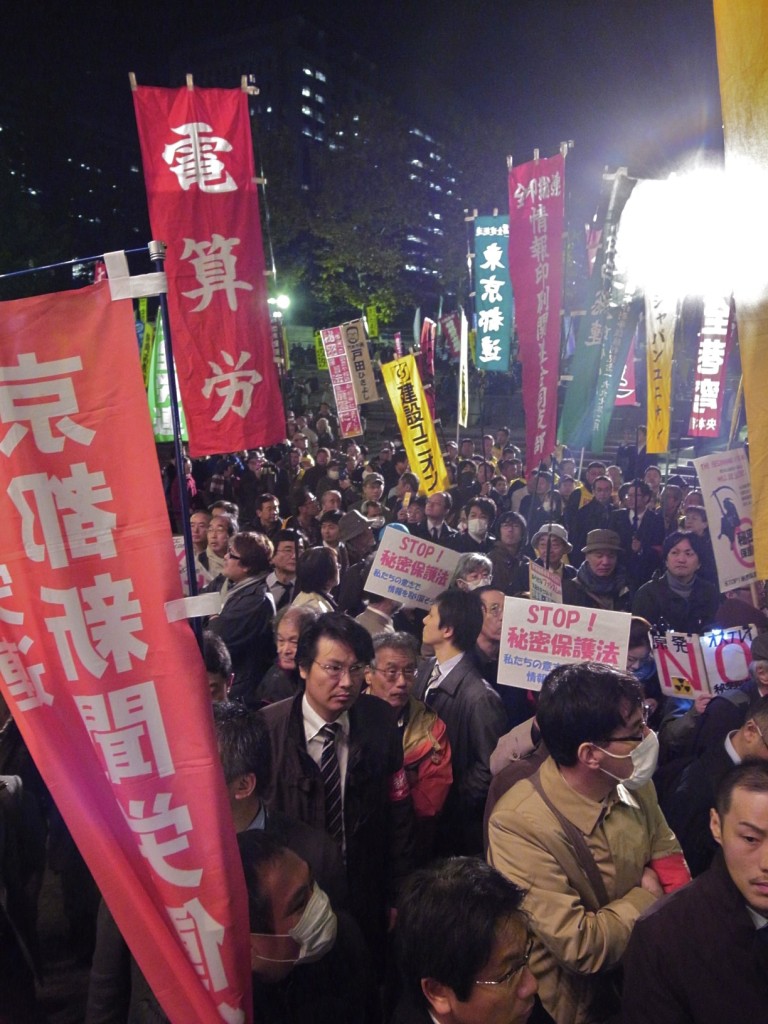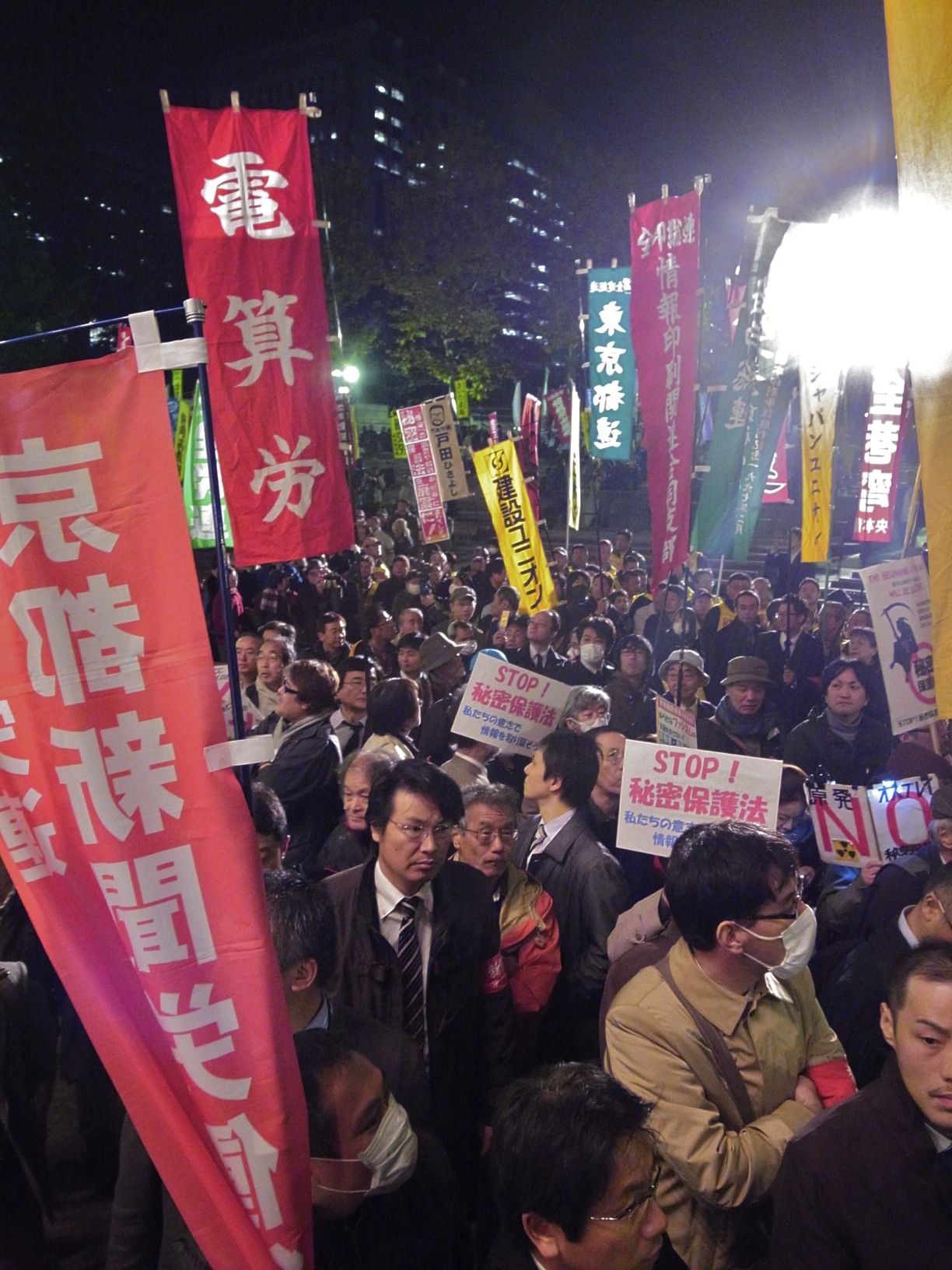December 5th, Tokyo
We’re late, We’re late for a very important date
We have no time for reasoned debate
We’re late, We’re late…
The Japanese government came very close to passing the ominous new Designated Secrets Bill today, when the Upper House Committee cut off debate around 4pm and forced a vote. The law punishes journalists and whistleblowers who divulge government secrets with up to ten years in prison, and up to five years for those who “instigate leaks.”
The tally yesterday came amongst cries of “This government has no conscience”, “Don’t make fools of the Japanese people” in a shouting match that was very close to a brawl. Meanwhile outside the Diet building over 1,000 protestors chanted opposition. Prime Minister Shinzo Abe (Liberal Democrat Party) is pushing the bill forward, despite a sudden dip in his support rates to below 50%. Earlier this week, the LDP Secretary General, Shigeru Ishiba, labeled the growing protests “tantamount to terrorism” which prompted more public outcry.

The ruling parties had planned to hold an emergency vote on the bill in the middle of the night the same day, and make it law. They were forced to back down for another day by time stalling motions from the opposing Democratic Party of Japan (DPJ).
If as part of their information gathering, a reporter or individual asks the wrong question about a designated secret to a public official, the police could call them in for voluntary questioning, and seize their laptop or smart phone. If they arrested him or her, the suspect could be held in detention for more than twenty days. It wouldn’t matter whether the individual knew they were asking about a secret or not.
Kiss, Kiss, Hush-Hush, Abe Tries Damage Control With The Foreign Media
As the bill meets increasing opposition at home and abroad, Prime Minister Shinzo Abe’s coalition government moved earlier this week to do damage control with the foreign media, by holding a “secret” meeting on the Secrecy Bill. JSRC and the FCCJ (Foreign Correspondent’s Club of Japan) were not formally notified of the briefing, which was sent out to select members of the press by the Prime Minister’s Office of Global Communications.*
Prime Minister Abe’s Cabinet Intelligence and Research Office held the “background briefing on Special Intelligence Protection Bill” at 3pm Wednesday at the Central Government Offices in Tokyo.
The press who were invited and attended were told in advance: “Ground rules: Comments from the briefing can be attributed to a Japanese Government Official. The briefing will in principle be in English. The briefing is for pen reporters only (no still or movie cameras allowed). Journalists are required to observe relevant rules, ethics and standards of propriety.”
It is slightly unusual for the Abe administration to pay much attention to the views of the foreign press, yet the hard-hitting criticism of the foreign media has become hard for them to ignore. However, like Ishiba’s comments equating protestors with terrorists, the slightly menacing tone of the briefing announcement echoes the problems with the bill.
Ironically, according to Japanese legal experts, under the current draft of the legislation, “impropriety” in newsgathering techniques involving state secrets can result in jail time. In theory, under the secrecy law, if the briefing had been declared a state secret, any unauthorized journalist writing about it could be found guilty of violations and sentenced up to ten years in prison. Any journalist who asked pointed and repeated questions about such a secret briefing, could also be arrested and tried for “instigating leaks” and sentenced up to five years in prison.
Tsutomu Shimizu, a criminal defense lawyer and representative of the Japan Federation of Bar Association, explains the problems with the bill as follows. “If as part of their information gathering, a reporter or individual asks the wrong question about a designated secret to a public official, the police could call them in for voluntary questioning, and seize their laptop or smart phone. If they arrested him or her, the suspect could be held in detention for more than twenty days. It wouldn’t matter whether the individual knew they were asking about a secret or not. Eventually, a judge would decided whether the information gathering was ‘grossly inappropriate’…The judge would not have the right to know what ‘secret’ was leaked and the same might also be true for the defendant. This would make a legal defense difficult.”
Shimizu noticed that simply having their laptop seized or being called in for voluntary questioning would greatly intimidate most journalists. Cabinet officials have also stated that police raids on media outlets suspected to be involved in the leaking of secrets would be possible.
It is not hard to see why the Abe cabinet is rushing to get the bill into law, even under the cover of night. The opposition continues to grow within Japan and overseas. Even the director of classics like Spirited Away, Hayao Miyazaki—the Walt Disney of Japan—came forward to express his concerns. The list of organizations and individuals expressing concern over the bill is far-reaching. They include Gakusha-no-kai, which is led by Nobel Prize laureate Hideki Shirakawa and Toshihide Masukawa plus 2000 scholars. There are also Japan’s: Newspaper Publishers & Editors Association, Commercial Broadcasters Association, Magazine Publishers Association, Book Publishers Association, Federation of Bar Associations. Even Navi Pillay, the U.N. High Commissioner for Human Rights expressed her fears.
Abe when questioned about Ms. Pillay’s concerns retorted, “The law says we have to give sufficient consideration to freedom of the press. There is nothing to worry about.” It was very similar to a statement he made concerning the state of the nuclear disaster in Fukushima, in which he famously declared that everything was “completely under control.”
The bill is expected to be voted into law as early as tomorrow (December 6th). Over 50% of the Japanese population opposes the legislation and only 25% support it, according to the latest opinion polls.
Designed by Kafka, Inspired by Hitler?
Kafka would seem the most likely inspiration for this perplexing legislation but ruling coalition members acknowledge that another famous white man from the past may have provided the real inspiration for the bill and its implementation.
An Upper House member of the Diet said on background to JSRC, “Deputy Prime Minister Aso Taro sort of telegraphed the punches of the administration by expressing his admiration for how the Nazi Party forcefully changed the German constitution this summer. Obviously, we’re not Nazis in Japan–because we hardly have any Jews, but we are like the defeated post World War I Germany in that we do not have the right to wage war to defend ourselves from our enemies. Just as Germany needed a strong man like Hitler to revive defeated Germany, Japan needs people like Abe to dynamically induce change.”
The hawkish Prime Minister Abe has publicly stated his ambition to revise Japan’s constitution to rid it of Article 9, which forbids Japan from waging war. Upper house Diet member, Taro Yamamoto and others have publicly stated they believe the current bill is a stepping-stone to recreate a fascist Japan, as it existed prior to the Second World War.
It might all seems like a bad joke, except for the Orwellian nature of the bill being proposed and a key Cabinet member expressing his admiration for the Nazis.
*This reporter did not attend the background briefing, which would have been an agreement to abide by its terms and credit the party line as “from a government official.”

[…] Japan: Even The Secrecy Bill Briefing Is Secret; Abe-gumi Pushes Ominous Secrecy Bill Towards Law (japansubculture.com) […]